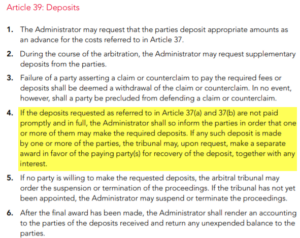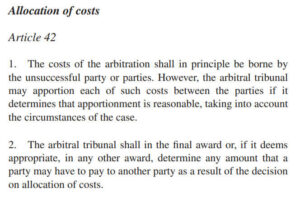Summary procedures in international arbitration mean procedures by which the arbitral tribunal determines certain points of fact or law at an early stage of the proceedings, potentially dispensing with the need for further arbitration proceedings. Summary proceedings can be a blessing to a respondent facing frivolous claims that obviously lack merit, as a successful dismissal […]
Arbitration Rules
Who Can Be an Arbitrator in International Arbitration?
In the not-too-distant past, there were only a few individuals acting regularly as arbitrators in international arbitration. Similarly, law firms engaged in international arbitration could be counted on the fingers of one hand. Unsurprisingly, there were a very small number of individuals, generally well-connected, who were called upon to act as arbitrators. This trend, however, […]
Non-Payment of Advances on Costs in Arbitration
The commencement of international arbitration is conditioned by payment of advances on costs, after the payment of a filing fee. Unlike domestic courts, which are publicly-funded, advances on costs are needed to pay the fees of private arbitrators. If the arbitration is administered, costs also need to be advanced to pay the administrative costs of […]
Advance on Costs in SCC Arbitration
When an arbitration agreement provides for arbitration with the Arbitration Institute of the Stockholm Chamber of Commerce (“the SCC”), the parties should bear in mind that they will be required to pay several costs over the course of the proceedings. In the following paragraphs, we will discuss the regime of the advance on costs in […]
The Recoverability of Arbitration Costs
Costs tend to be a major concern for users of international arbitration. However, a successful party may recover them in full or in part, including the costs of legal representation. In this respect, both national arbitration legislation and institutional rules generally grant arbitrators the power to award the costs. Though the UNCITRAL Model Law is […]
Cybersecurity in International Arbitration
Cyberattacks in today’s digital world are becoming increasingly common and international arbitration has not remained unaffected. To the contrary, international arbitration can be highly susceptible to cyberattacks. This is explained by its very nature and underlying principles, namely privacy, confidentiality, procedural flexibility and the involvement of multiple players and sensitive data. In 2015, for instance, […]
Refusing to Participate in Arbitration Proceedings
Parties who signed a binding arbitration agreement are, in principle, bound by its terms. Once a dispute arises and a claimant commences arbitration proceedings against a respondent, a general assumption is that the parties will cooperate and actively participate in the proceedings. In practice, however, it can happen that the other party, usually the respondent, […]
محكمة التحكيم الدولية التابعة لغرفة التجارة الدولية
محكمة التحكيم الدولية التابعة لغرفة التجارة الدولية تأسست غرفة التجارة الدولية في عام 1919 بهدف خدمة قطاع الأعمال الدولي وتعزيز التجارة والاستثمار وفتح الأسواق. وقد نشأت محكمة التحكيم الدولية عام 1923و تعتبر الأن أهم مؤسسات التحكيم في العالم.1 دور محكمة التحكيم الدولية التابعة لغرفة التجارة الدولية محكمة التحكيم الدولية التابعة لغرفة التجارة الدولية “المحكمة” هي مؤسسة تحكيم مستقلة تابعة […]
تنفيذ أحكام التحكيم وفقا لاتفاقية نيويورك 1958 في سلطنة عمان
انضمت سلطنة عمان الى اتفاقية الاعتراف بقرارات التحكيم الأجنبية وتنفيذها (“نيويورك لعام 1958”) في عام 1998وجاء التصديق بموجب المرسوم السلطاني رقم 36 لعام 1998.[1] وتعد اتفاقية نيويورك 1958 أداة رئيسية في فعالية التحكيم التجاري الدولي [2]حيث بلغ عدد أطرافها 161 دولة،[3] التزموا جميعا بموجبها بالاعتراف باتفاقات التحكيم من ناحية ، وتنفيذها القرارات الصحيحة الصادرة عنها […]








